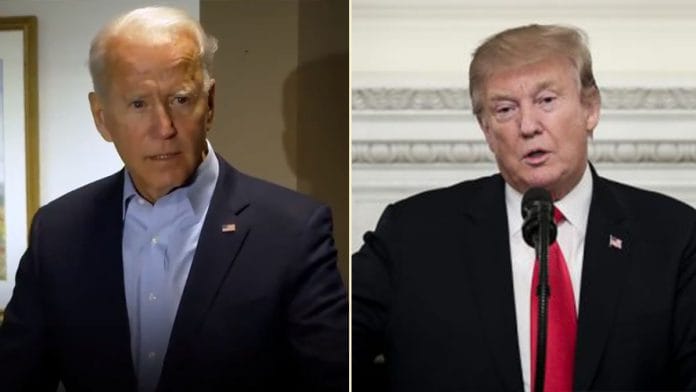New Delhi: The US presidential debate is just a day away in which Republican incumbent President Donald Trump and Democratic nominee Joe Biden will go head-to-head, and likely discuss a host of issues — from racial protests to the Covid-19 pandemic.
This will be the first of the three debates — the second and third will take place on 15 October and 22 October, respectively.
Vice-presidential candidates — Democratic nominee Kamala Harris and sitting vice-president Mike Pence — will also face off in a separate debate on 7 October.
Historically, presidential debates have been an entertaining opportunity for voters to learn about the candidates outside the realm of strategic campaigning, see how likeable they are and learn about their politics on certain issues.
These debates also attract a wide viewership. In October 2016, 71.6 million people tuned in to watch the final debate between then contenders Hillary Clinton and Donald Trump.
Not legally binding, the debates are an “election mainstay”, but they don’t necessarily shift election outcomes as a 2019 study by Harvard Business School has found.
This is because debates usually take place too late in the election cycle, argued James Stimson, professor of Political Science Emeritus at the University of North Carolina.
Nevertheless, the past debates have had some key moments; here’s a look at a few of them.
Also read: Why Biden has the upper hand over Trump in expectations game for tomorrow’s debate
Richard Nixon’s ‘tired’ appearance
The first ever debate that was televised was in 1960 between Democratic Senator John F. Kennedy and sitting vice-president Richard Nixon.
Many argue that Republican nominee Nixon lost the election because of his performance during the debate as he didn’t wear make-up and appeared fatigued and gaunt, and had also been sweating profusely throughout.
The next series of debates happened only after 16 years due to several reasons, including some candidates refusing to debate — like Lyndon Johnson in 1964 and Nixon in 1968 and 1972 — as well as some organisational hiccups during that period.
Gerald Ford’s factual blunder
In 1976, President Gerald Ford made a factual blunder while debating against Democratic challenger Jimmy Carter, back then a little known Georgia governor.
Ford had said: “There is no Soviet domination of Eastern Europe.”
The moderator, The New York Times’ Max Frankel, replied: “I’m sorry, what? … Did I understand you to say, sir, that the Russians are not using Eastern Europe as their own sphere of influence in occupying most of the countries there and making sure, with their troops, that it’s a communist zone?”
Ford further argued that Poland, Romania and Yugoslavia are free from Soviet domination — a statement that is speculated to have cost him the election later.
Ronald Reagan’s one-liners
In 1980, former California Governor Ronald Reagan went head to head with President Jimmy Carter where he chose to use short one-liners to undermine his opponent’s focus on policy issues, saying: “There you go again”, which elicited laughter from the audience.
He also asked viewers: “Are you better off than you were four years ago?” in reference to the state of the economy.
In 1984, when asked if he was too old to be contesting elections, 73-year-old Reagan came up with a witty reply during his debate against Democratic opponent Walter Mondale.
“I will not make age an issue of this campaign. I am not going to exploit, for political purposes, my opponent’s youth and inexperience,” he said, which even caused Mondale to laugh.
Also read: Trump plays the game of gaming the presidential debates
George Bush taps his watch
During a 1992 town-hall style debate alongside his Democratic competitor Bill Clinton and third-party candidate Ross Perot, Republican candidate George W. Bush stood up and tapped his watch.
The gesture led viewers to believe that Bush, who was the President at the time, didn’t care to listen to the grievances of ordinary citizens. He went on to lose the election to Clinton.
Mary Kate Cary, who was a White House speechwriter for Bush during that time, later explained that Bush was gesturing to the moderator that either Clinton and Perot had gone “way over their time” but it backfired.
Cary added: “The audience doesn’t know the rules… and thinks he’s looking at his watch because he’s got something better to do and wants to go get a hamburger or something.”
Donald Trump’s ‘own reality’
In 2016, during Hillary Clinton and Donald Trump’s first presidential debate, the two debated over trade issues, specifically the Trans-Pacific Partnership.
Trump suggested Clinton had first supported the deal and then withdrew support after he spoke out against it.
The exchange led Clinton to say: “Well Donald, I know you live in your own reality but that is not the facts.”
Her reply drew laughter from the audience before Clinton went on to say: “The facts are, I did say I hoped it would be a good deal but when it was negotiated, which I was not responsible for, I concluded it wasn’t.”
It was also in this debate that Clinton famously ‘shimmied’ by casually shaking her shoulders, sparking a flurry of memes and GIFs on the internet.
In a later debate where candidates were free to roam around the stage, Trump was criticised for standing right behind Clinton while she was answering an audience member’s question about Obamacare.
While some Twitter users asked why he was “lurking” behind her, Trump’s campaign manager at the time, Kellyanne Conway, accused Clinton and the media of ‘spinning’ a narrative.
Also read: US presidential candidate can win even without majority of popular vote. Here’s why






